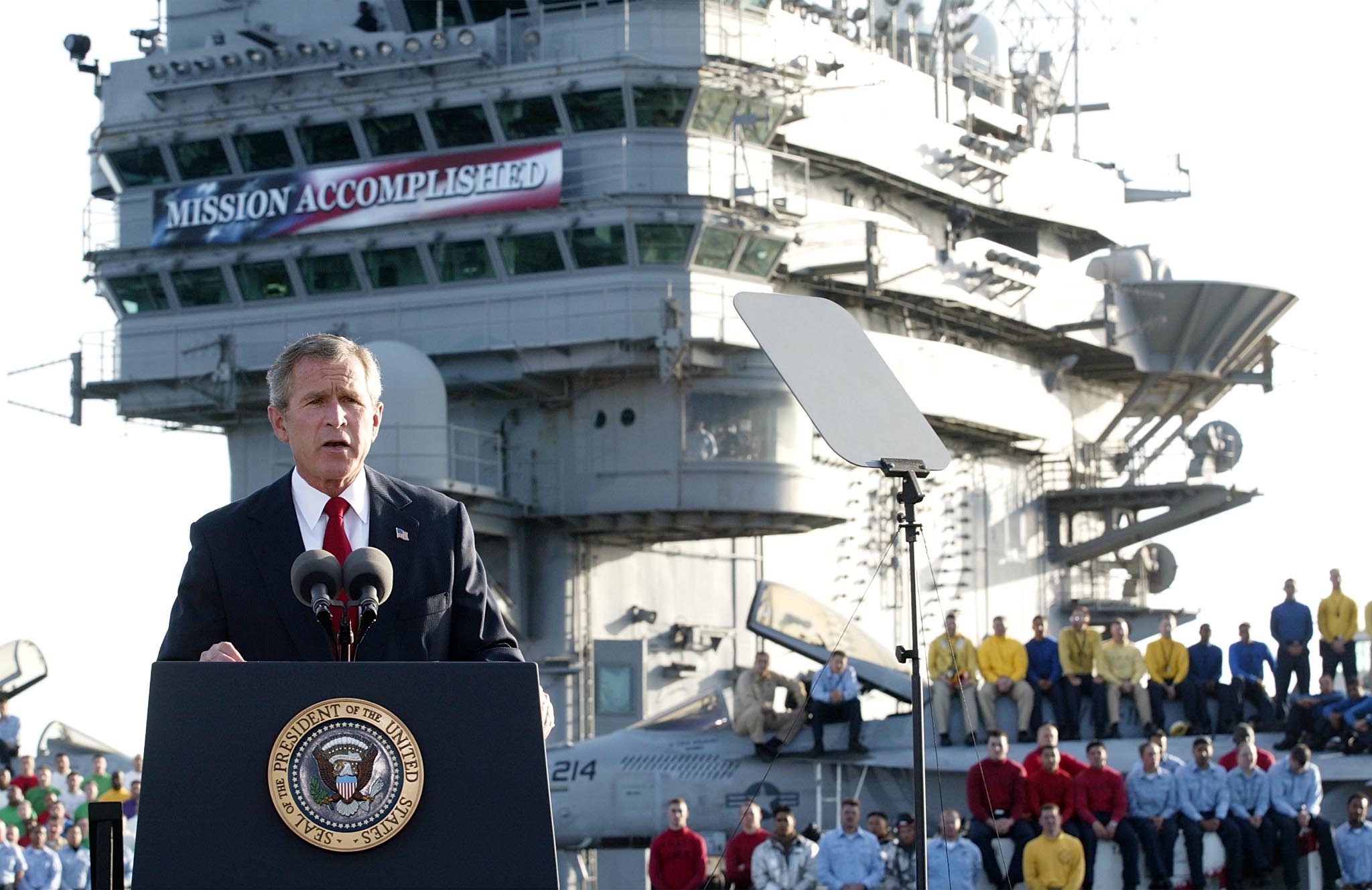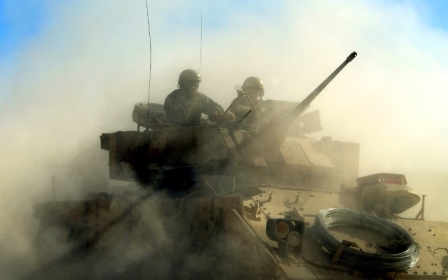16 years after US invasion of Iraq, ex-spokesman defends Bush over WMD lies

Sixteen years ago, American and British tanks rolled into Iraq. In a matter of weeks, the government of Saddam Hussein was toppled, the Iraqi army disbanded and the Iraqi state dissolved.
Less than two months after the invasion, then-US President George W Bush appeared on a warship to celebrate the supposed victory, with a banner proclaiming, "Mission Accomplished" hanging behind him.
The conflict had only just begun.
Sectarian bloodshed, massacres, human rights abuses, and militant attacks on civilians would haunt Iraq for years. And the Bush administration's stated reason for going to war - that Hussein possessed weapons of mass destruction (WMDs) and was harbouring militants linked to the 9/11 attacks - turned out to be false.
The prevailing opinion in Washington today is that the war was a mistake.
New MEE newsletter: Jerusalem Dispatch
Sign up to get the latest insights and analysis on Israel-Palestine, alongside Turkey Unpacked and other MEE newsletters
Still, on the 16th anniversary of the invasion, Bush's former spokesman leapt to the ex-president's defence, saying that the Iraq war was based on faulty intelligence, not deliberate lies.
"There is a myth about the war that I have been meaning to set straight for years," former White House press secretary Ari Fleischer wrote in a series of tweets on Wednesday.
"After no WMDs were found, the left claimed 'Bush lied, People died.' This accusation itself is a lie. It's time to put it to rest."
The administration had "faithfully and accurately" reported to the public what it had been told by intelligence agencies about Iraq having WMDs, Fleischer said.
"The CIA, along with the intelligence services of Egypt, France, Israel and others concluded that Saddam had WMD," he wrote. "We all turned out to be wrong. That is very different from lying."
Critics were quick to point to a different version of the events, one in which US policymakers, namely Bush and his vice president, Dick Cheney, cherry-picked intelligence to justify their intent to go to war.
'Known lies'
On Wednesday, as criticism of Fleischer's comments rolled in, US Democratic Congresswoman Ilhan Omar pointed to remarks made by Cheney linking the Iraqi government to the 9/11 attackers and stating that there was no doubt Baghdad had weapons of mass destruction.
"All of these statements were not only false, they were known by intelligence agencies to be lies at the time," she wrote on Twitter. "To this day they have not been held accountable."
Intelligence agencies had indeed reported that Hussein had been trying to acquire aluminium cylinders that could only be used for a nuclear programme.
But the US Department of Energy dismissed the idea that the tubes could only be used for that purpose in an internal memo to top officials almost two years before the war began.
Moreover, Bush repeatedly exaggerated Iraq's military capabilities, well beyond the already-shaky intelligence provided to the administration at the time.
"Iraq continues to flaunt its hostility toward America and to support terror," Bush said during his 2002 State of the Union address. "The Iraqi regime has plotted to develop anthrax, and nerve gas, and nuclear weapons for over a decade."
That same year, he said Iraq has a "massive stockpile of biological weapons" that are "capable of killing millions".
In a book by journalist Ron Suskind released in 2004, Paul O'Neill, who served as secretary of treasury during the first two years of Bush's presidency, revealed that the administration had been planning the invasion before the 9/11 attacks or the faulty intelligence reports.
"In the 23 months I was there, I never saw anything that I would characterise as evidence of weapons of mass destruction," O'Neill later told TIME magazine. "There were allegations and assertions by people."
Tens of thousands of Iraqis and more than 4,000 US soldiers were killed in the war.
The conflict also became a magnet for al-Qaeda-linked militants who eventually rebranded themselves as the Islamic State (IS) group, wreaking havoc in Iraq and Syria and waging attacks against civilians across the world.
"In the United States of Amnesia, total silence in the corporate media on the 16th anniversary of the invasion and destruction of Iraq - liberal and illiberal scribes are united on such matters," Iraqi-American academic Sinan Antoon wrote on Twitter on Wednesday.
Middle East Eye delivers independent and unrivalled coverage and analysis of the Middle East, North Africa and beyond. To learn more about republishing this content and the associated fees, please fill out this form. More about MEE can be found here.




